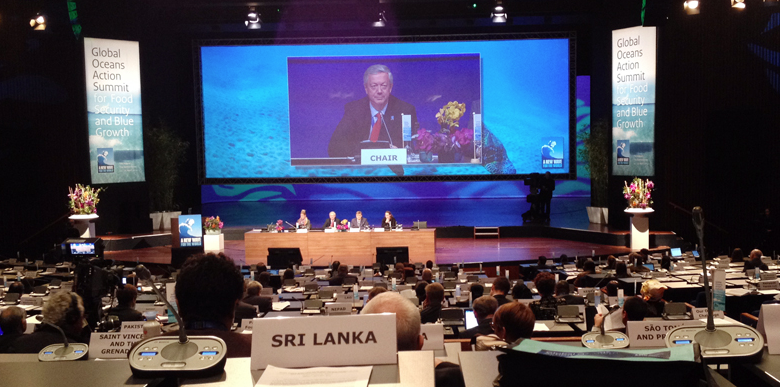Urgent, coordinated action is needed to restore productive, resilient oceans, ensure food security and support human livelihoods, according to participants at the Global Oceans Action Summit for Food Security and Blue Growth.
The Summit also called for oceans to be embedded in the post-2015 development agenda, preferably in a stand-alone sustainable development goal (SDG) on oceans.
 25 April 2014: Urgent, coordinated action is needed to restore productive, resilient oceans, ensure food security and support human livelihoods, according to participants at the Global Oceans Action Summit for Food Security and Blue Growth. The Summit also called for oceans to be embedded in the post-2015 development agenda, preferably in a stand-alone sustainable development goal (SDG) on oceans.
25 April 2014: Urgent, coordinated action is needed to restore productive, resilient oceans, ensure food security and support human livelihoods, according to participants at the Global Oceans Action Summit for Food Security and Blue Growth. The Summit also called for oceans to be embedded in the post-2015 development agenda, preferably in a stand-alone sustainable development goal (SDG) on oceans.
The Summit, which took place from 22-25 April in The Hague, the Netherlands, aimed to raise global attention and investment on countering the threats to oceans, namely climate change, habitat destruction, over-fishing and pollution. Participants explored solutions for balancing the economic demands and the ecological needs of oceans, with an emphasis on governance structures and finance mechanisms. The report of the meeting contains principles and recommendations for positioning ocean health and “blue growth” more prominently on the international development agenda.
The high-level segment of the Summit was attended by over 80 ministers, chief executive officers, and heads of organizations, from around the world. The Chair’s summary of the Summit contains “Pitches for action” emanating from the meeting’s discussions and further elaborated during its high-level segment. These recommendations were not formally adopted, but rather regarded as “key messages” from the Summit. They are grouped under five themes: integrated approaches – breaking down silos; governance; public-private partnerships; investments; and research and development/innovation.
Participants agreed on the need to, inter alia: eliminate subsidies that contribute to over-fishing and overcapacity; incentivize approaches that improve conservation, build sustainable fisheries and end illegal, unreported and unregulated (IUU) fishing; strengthen the mandate and financing of Regional Fisheries Management Organizations (RFMOs); and invest in small and medium scale fisheries as vital stewards for growth and to support sustainable supply chains. The meeting also called for greater attention to the impacts of climate change on oceans, as well as the inclusion of ocean health in the UN Framework for Convention on Climate Change (UNFCCC) process.
Ten partnerships were announced at the Summit. The Netherlands and the Rockefeller Foundation will support the Food and Agriculture Organization of the UN (FAO) and WorldFish in the production of a Roadmap for the Future of Fish. Mauritius, Seychelles and the Marine Stewardship Council (MSC) will work to certify fish species in the Indian Ocean. Indonesia and the Netherlands will partner to eliminate fish waste and ensure safe, high-quality fish products for Indonesian consumers. Partnerships will also focus on: the Ocean Health Index; the effectiveness of marine protected areas (MPAs); and data exchanges.
More than 600 delegates attended the event, which was organized by the Government of the Netherlands, in close collaboration with FAO, the World Bank and the Governments of Grenada, Indonesia, Mauritius, Norway and the US. [IISD RS Coverage of the Meeting] [Global Oceans Action Summit Website] [FAO Press Release]